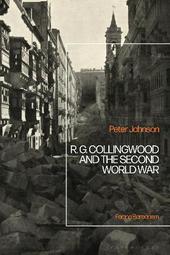
|
R.G Collingwood and the Second World War: Facing Barbarism
Hardback
Main Details
| Title |
R.G Collingwood and the Second World War: Facing Barbarism
|
| Authors and Contributors |
By (author) Dr Peter Johnson
|
| Physical Properties |
| Format:Hardback | | Pages:256 | | Dimensions(mm): Height 234,Width 156 |
|
| Category/Genre | History |
|---|
| ISBN/Barcode |
9781350160644
|
| Classifications | Dewey:192 |
|---|
| Audience | | Tertiary Education (US: College) | |
|---|
| Illustrations |
10 bw illus
|
|
Publishing Details |
| Publisher |
Bloomsbury Publishing PLC
|
| Imprint |
Bloomsbury Academic
|
| Publication Date |
14 January 2021 |
| Publication Country |
United Kingdom
|
Description
R.G Collingwood's prolific works have shaped the debate about the nature of civilisation and its status as an ideal governing art, morality and social and political existence. As one of the few philosophers to subject civilisation and barbarism to close analysis, R.G Collingwood was acutely aware of the interrelationship between philosophy and history. In Peter Johnson's highly original work, R.G Collingwood and the Second World War: Facing Barbarism, Johnson combines historical, biographical and philosophical discussion in order to illuminate Collingwood's thinking and create the first in-depth analysis of R.G Collingwood's responses to the Second World War. Peter Johnson examines how R.G Collingwood's responses to the war developed from his early rejection of appeasement as a policy for dealing with Hitler's Germany, through his view of Britain's prosecution of the war once the battle with Nazism had been joined, and finally to his picture of a future liberal society in which civility is its overriding ideal.
Author Biography
Peter Johnson is Visiting Research Fellow at the University of Southampton, UK. His publications include R G Collingwood: An Introduction (1998) and Collingwood's The Ideas of History: A Reader's Guide (2013).
ReviewsDeeply at odds with the cliches that reduce R. G. Collingwood's lasting legacy to elements of aesthetics, theory of presuppositions and historical re-enactment (but expertly circumscribing these contributions to Collingwood's philosophy of mind, history, anthropology and philosophical methodology), Peter Johnson aptly unfolds - from the interstices of The New Leviathan and other related writings - a political philosophy perfectly reflective of the Oxford don's lifetime credo that in a world without metaphysics (as philosophical critique of presuppositional foundations of a culture) conditions will be more favourable to the development of irrationalism. * Florin Lobont, Professor of Philosophy, West University of Timisoara, Romania *
|